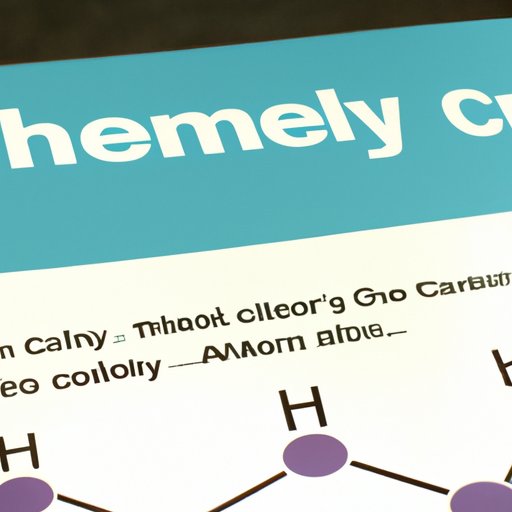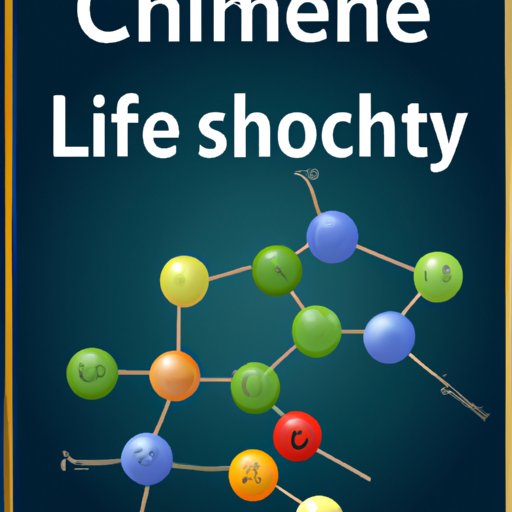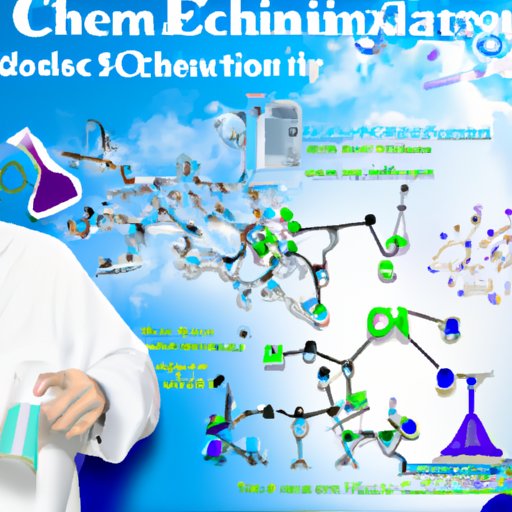Introduction
Chemistry is a branch of science that studies the composition, structure, properties, and interactions of matter. It is an essential part of our lives, as it helps us understand the world around us and how different substances interact with each other. But what exactly is Chemistry science and how does it work? This article will explore the basics of Chemistry, its applications in everyday life, biology, and industry, and its impact on the environment.
Exploring the Basics of Chemistry: What is Chemistry Science?
The term “chemistry” comes from the Greek word “chemeia”, which means “the art of preparing and using drugs”. It has evolved over time to encompass the study of matter and its properties and reactions. Chemistry is the science of matter and how it behaves, interacts, and changes. In other words, it is the study of the composition, structure, properties, and reactions of matter.
The history of Chemistry dates back to ancient times. Ancient civilizations such as the Egyptians, Greeks, and Romans used Chemistry for various purposes, including medicine, agriculture, and metallurgy. Alchemists during the Middle Ages sought to uncover the secrets of transforming common metals into gold and silver. During the Scientific Revolution, scientists began to use experimentation and observation to develop theories about matter and its properties.
Today, Chemistry is divided into several subdisciplines, including physical chemistry, organic chemistry, biochemistry, inorganic chemistry, and analytical chemistry. Each of these fields focuses on a specific aspect of Chemistry, such as the structure and properties of matter or the reactions between different substances.

Chemistry 101: A Guide to Understanding Chemistry
At its core, Chemistry is based on certain basic principles. These include the law of conservation of mass, the law of definite proportions, and the law of multiple proportions. The law of conservation of mass states that matter can neither be created nor destroyed. The law of definite proportions states that a given compound always contains the same elements in the same proportions by mass. The law of multiple proportions states that if two elements form more than one compound, then the ratios of the masses of the second element which combine with a fixed mass of the first element will be ratios of small whole numbers.
Chemistry also involves the study of different types of chemical reactions. These include combination reactions, decomposition reactions, precipitation reactions, and redox reactions. In a combination reaction, two or more reactants combine to form a single product. In a decomposition reaction, a single reactant breaks down into two or more products. In a precipitation reaction, two solutions are mixed together and a solid precipitate forms. And in a redox reaction, electrons are transferred between two species.
In order to express Chemical reactions, chemists use equations. Equations are written using symbols to represent the reactants and products of a reaction. The equation must be balanced, meaning that the number of atoms of each element on either side of the equation must be equal. Balancing equations is an important skill for chemists, as it allows them to accurately predict the outcome of a reaction.
Chemistry in Everyday Life: How Chemistry Impacts Us
Chemistry plays an important role in our everyday lives. From the food we eat to the medicines we take, Chemistry is involved in almost every aspect of our lives. For example, food production relies heavily on Chemistry to ensure the safety and quality of food products. Chemicals are used to preserve food, enhance flavor, and improve texture. Medicines, too, rely on Chemistry to produce safe and effective drugs.
The impact of Chemistry on human health cannot be overstated. Many of the treatments and medications used to treat diseases and conditions are based on Chemistry. Without Chemistry, many of the advances made in modern medicine would not be possible. Additionally, Chemistry plays an important role in environmental protection. Chemicals are used to clean up pollutants and protect ecosystems.
Chemical Reactions: An Overview of Chemistry
A Chemical reaction is a process in which one or more substances are transformed into one or more new substances. Chemical reactions involve the breaking of bonds between atoms and the formation of new bonds. The rate of a reaction depends on several factors, such as temperature, pressure, and concentration of reactants.
There are several different types of Chemical reactions. These include synthesis reactions, decomposition reactions, combustion reactions, and single replacement reactions. In a synthesis reaction, two or more reactants combine to form a single product. In a decomposition reaction, a single reactant breaks down into two or more products. In a combustion reaction, a fuel reacts with oxygen to produce heat and light. And in a single replacement reaction, one reactant displaces another reactant from a compound.

The Chemistry of Life: Exploring the Role of Chemistry in Biology
Chemistry plays a vital role in biology. All living organisms are composed of molecules, which are made up of atoms. Chemistry is used to study the structure and function of these molecules, as well as the interactions between them. Chemistry is also used to study the metabolism of cells, which is the process by which cells break down and build up molecules in order to carry out their functions.
Chemistry is used to study the structure and function of proteins, which are essential for life. Proteins are made up of amino acids, which are molecules composed of carbon, hydrogen, oxygen, and nitrogen. Chemistry is used to determine the structure of proteins and how they interact with other molecules. Chemistry is also used to study DNA and RNA, which are the genetic materials responsible for inheritance.
Chemistry also plays an important role in understanding and treating disease. Many diseases are caused by abnormalities in the structure or function of molecules. By understanding the chemistry of these molecules, scientists can develop treatments for these diseases.

Chemical Engineering: Exploring the Applications of Chemistry in Industry
Chemistry is also used in industry. Chemical engineers use Chemistry to develop processes and products for industrial use. Chemical engineering involves the application of principles of Chemistry to design and optimize processes for the production of chemicals and materials. Chemical engineers also use Chemistry to develop new materials and products, such as pharmaceuticals and plastics.
Chemical engineers use Chemistry to develop processes that are efficient, cost-effective, and environmentally friendly. They use their knowledge of Chemistry to design new processes, optimize existing ones, and troubleshoot any problems that arise. Additionally, they use Chemistry to develop new materials and products for industrial use.
Conclusion
This article has explored what is Chemistry science. We have looked at the definition of Chemistry, its history and evolution, and the different areas of study within Chemistry. We have also explored the basic principles of Chemistry, the different types of Chemical reactions, and how Chemistry is used in everyday life, biology, and industry. Finally, we have discussed the impact of Chemistry on the environment.
Chemistry is an essential part of our lives and the world around us. It helps us understand the world and how different substances interact with each other. Knowing the basics of Chemistry can help us make informed decisions about our health, the environment, and the products we use.
(Note: Is this article not meeting your expectations? Do you have knowledge or insights to share? Unlock new opportunities and expand your reach by joining our authors team. Click Registration to join us and share your expertise with our readers.)
